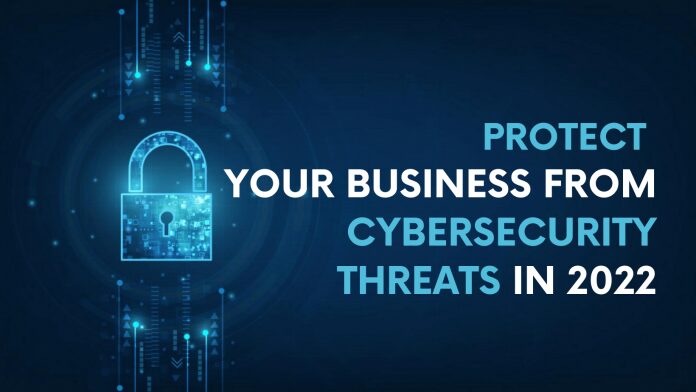The digital era is in full swing. Society’s reliance on information technology and the availability of online information leaves both businesses and individuals vulnerable to potential cybersecurity threats. In basic terms, a cybersecurity threat is a malicious attempt to steal data or cause disruption and damage to networks, computer systems, or assets. These attempts are most often the result of unauthorized access or “hacking.” Threats increase based on the vulnerability of your technical systems and the probability that your business or personal information would be attractive to potential thieves.
Potential cybersecurity threats may include viruses and ransomware, data theft, phishing scams, and even insider vulnerabilities—all of which can hinder operations or even shut down organizations completely. With so much of society’s day-to-day business and personal transactions occurring online, it is essential for entrepreneurs to understand how to protect themselves. From robust technical hardware and software to information back-ups and risk management strategies, planning ahead can help businesses mitigate damage from potential cyberattacks.
Cybersecurity threats are no longer restricted to private businesses—even government organizations and non-profits are vulnerable targets. By gaining access to any operating system, it becomes very easy for hackers to employ malware to encrypt victims’ files.
The following tips from ELIJAH will help protect your organization from cybersecurity threats.
Keep Systems Current

It is crucial for all businesses to keep their technical assets updated. Hardware (e.g., computer systems, servers, CPUs, motherboards) should be updated every five years, while software and applications should be updated whenever there is an update notification. Most software updates are security patches intended to keep your system secure. Along with bridging security gaps, updates may also introduce new features and improve the old ones—while enhancing processes and system stability. Although updating complex systems can be a challenge and may result in “downtime,” it is essential to ensure the integrity of your technical systems. Therefore, schedule updates during non-work hours to minimize operational disruptions.
Set Strong Passwords And Employ User Authentication
Although cybersecurity threats are constantly evolving, traditional technical security measures can still help to secure your organization. Password protection and firewalls are the first lines of defense when it comes to protecting computer systems. Organizations must ensure that employees set strong passwords (e.g., a minimum of 8 characters, including numbers, letters and symbols) for any administrative access—particularly if those staff are safeguarding vital data. For general user access to devices and systems, the Multifactor Authentication (MFA) security feature must be used. Methods of MFA include security access codes texted to a mobile device for access to an internal enterprise system. Important passwords should be memorized when possible, as third-party password storage websites are extremely unsafe.
Enable Firewall Protection
Firewalls are critical tools in safeguarding against external cybersecurity threats. A firewall is essentially a security feature on computer hardware or software that protects an organization by acting as a barrier between the internal enterprise network and external traffic. If the firewall identifies unusual or unauthorized access attempts, it will block and log those attempts. Firewalls can block spyware and malware, block spam emails and phishing attempts, and also protect against more significant disruptions such as hacking attempts. Investing in a robust firewall and keeping it updated is necessary for organizations of any size.
Keep Network Connections Secure
Regardless of an organization’s size and the complexity of its technical infrastructure, exposed or unstable networks remain a threat to the security of those systems and the privacy of client information. Insecure network security systems can also result in theft and damage to intellectual property. Safeguarding network connections can prevent hackers from stealing ideas, designs, production details, and other sensitive operational data.
Implement “Zero Trust” Security
“Zero Trust” is a one-of-a-kind security structure that requires all the employees of an organization to be authorized and authenticated for secure access to technical systems. The program is designed specifically to deal with the latest cybersecurity challenges. As more of the population transitions to working from home, “Zero Trust” is a crucial framework that provides security against emerging and agile ransomware threats.
Educate Your Employees
Internal security threats are the primary area of vulnerability in most organizations. Not only is it essential to train staff on the importance of cybersecurity, but employees should also maintain an awareness of how to identify and report potential threats. The most common way organizational information is breached is through email phishing scams. Educating employees on how to identify suspicious emails or digital files can help mitigate the risk of improper external access to technical infrastructure and digital information.
Limit Proper User Access
Multifactor authentication is an effective security feature that helps prevent unauthorized users from gaining access to sensitive data. In order to ensure secure user sign-ins, organizations may use a combination of user authentication methods like SMS/text messages, biometrics, emails, and security questions. It is best practice for organizations to leverage additional layers of protection such as email verification, text verifications, or one-time security codes. This level of security helps limit user access and ensures that only authorized individuals are permitted.
Cybersecurity threats and attacks are evolving each year as companies adopt cloud-based solutions, BYOD practices, and remote workplaces—among other technical innovations. In the digital era, safeguarding your business requires the best cybersecurity services. From securing networks and devices, backing up data, and monitoring systems and equipment to training employees and encrypting important files, ELIJAH’S team of skilled and experienced cybersecurity consultants are committed to finding the best solutions for your cybersecurity needs.







